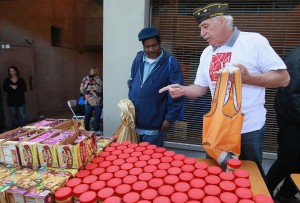
Military veterans are 50 percent more likely to be homeless than other Americans, according to a new joint study by the departments of Veterans Affairs (VA) and Housing and Urban Development (HUD). And among those homeless vets, one in four live in California.
Each year, HUD provides Congress with an assessment on the homeless population in the United States. The Veteran Homeless report released Thursday from the two agencies -- a first of its kind -- is considered a supplement to the 2009 annual report.
San Francisco Mayor Ed Lee, speaking on KQED's Forum with Michael Krasny Thursday morning, said his city has programs for homeless vets in place already... and that more are on the way:
"I’ve already been informed that we’re on our way to building our first veterans homeless housing center, and that’s with a group in Chinatown that’s helping to build that housing."
The report included a one-year estimate of homelessness among veterans, as well as a one-night snapshot, which found more than 75,000 homeless veterans nationwide sleeping on the streets or in a shelter.